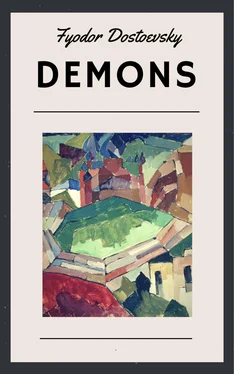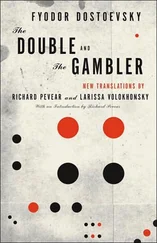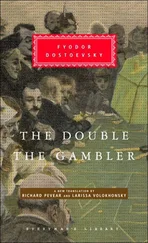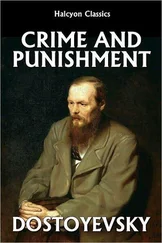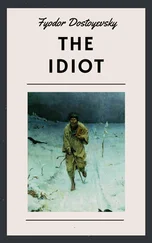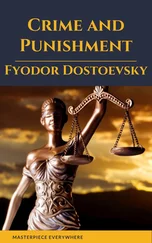“Let us go in,” said he, “I will do everything.”
I remembered that Liputin had told us he had taken the wooden lodge in the yard that morning. In the lodge, which was too large for him, a deaf old woman who waited upon him was living too. The owner of the house had moved into a new house in another street, where he kept a restaurant, and this old woman, a relation of his, I believe, was left behind to look after everything in the old house. The rooms in the lodge were fairly clean, though the wall-papers were dirty. In the one we went into the furniture was of different sorts, picked up here and there, and all utterly worthless. There were two card-tables, a chest of drawers made of elder, a big deal table that must have come from some peasant hut or kitchen, chairs and a sofa with trellis-work back and hard leather cushions. In one corner there was an old-fashioned ikon, in front of which the old woman had lighted a lamp before we came in, and on the walls hung two dingy oil-paintings, one, a portrait of the Tsar Nikolas I, painted apparently between 1820 and 1830; the other the portrait of some bishop. Mr. Kirillov lighted a candle and took out of his trunk, which stood not yet unpacked in a corner, an envelope, sealing-wax, and a glass seal.
“Seal your note and address the envelope.”
I would have objected that this was unnecessary, but he insisted. When I had addressed the envelope I took my cap.
“I was thinking you’d have tea,” he said. “I have bought tea. Will you?”
I could not refuse. The old woman soon brought in the tea, that is, a very large tea-pot of boiling water, a little tea-pot full of strong tea, two large earthenware cups, coarsely decorated, a fancy loaf, and a whole deep saucer of lump sugar.
“I love tea at night,” said he. “I walk much and drink it till daybreak. Abroad tea at night is inconvenient.”
“You go to bed at daybreak?”
“Always; for a long while. I eat little; always tea. Liputin’s sly, but impatient.”
I was surprised at his wanting to talk; I made up my mind to take advantage of the opportunity. “There were unpleasant misunderstandings this morning,” I observed.
He scowled.
“That’s foolishness; that’s great nonsense. All this is nonsense because Lebyadkin is drunk. I did not tell Liputin, but only explained the nonsense, because he got it all wrong. Liputin has a great deal of fantasy, he built up a mountain out of nonsense. I trusted Liputin yesterday.”
“And me to-day?” I said, laughing.
“But you see, you knew all about it already this morning; Liputin is weak or impatient, or malicious or … he’s envious.”
The last word struck me.
“You’ve mentioned so many adjectives, however, that it would be strange if one didn’t describe him.”
“Or all at once.”
“Yes, and that’s what Liputin really is—he’s a chaos. He was lying this morning when he said you were writing something, wasn’t he?
“Why should he?” he said, scowling again and staring at the floor.
I apologised, and began assuring him that I was not inquisitive. He flushed.
“He told the truth; I am writing. Only that’s no matter.”
We were silent for a minute. He suddenly smiled with the childlike smile I had noticed that morning.
“He invented that about heads himself out of a book, and told me first himself, and understands badly. But I only seek the causes why men dare not kill themselves; that’s all. And it’s all no matter.”
“How do you mean they don’t dare? Are there so few suicides?”
“Very few.”
“Do you really think so?”
He made no answer, got up, and began walking to and fro lost in thought.
“What is it restrains people from suicide, do you think?” I asked.
He looked at me absent-mindedly, as though trying to remember what we were talking about.
“I … I don’t know much yet.… Two prejudices restrain them, two things; only two, one very little, the other very big.”
“What is the little thing?”
“Pain.”
“Pain? Can that be of importance at such a moment?”
“Of the greatest. There are two sorts: those who kill themselves either from great sorrow or from spite, or being mad, or no matter what … they do it suddenly. They think little about the pain, but kill themselves suddenly. But some do it from reason—they think a great deal.”
“Why, are there people who do it from reason?”
“Very many. If it were not for superstition there would be more, very many, all.”
“What, all?”
He did not answer.
“But aren’t there means of dying without pain?”
“Imagine”—he stopped before me—“imagine a stone as big as a great house; it hangs and you are under it; if it falls on you, on your head, will it hurt you?”
“A stone as big as a house? Of course it would be fearful.”
“I speak not of the fear. Will it hurt?”
“A stone as big as a mountain, weighing millions of tons? Of course it wouldn’t hurt.”
“But really stand there and while it hangs you will fear very much that it will hurt. The most learned man, the greatest doctor, all, all will be very much frightened. Every one will know that it won’t hurt, and every one will be afraid that it will hurt.”
“Well, and the second cause, the big one?”
“The other world!”
“You mean punishment?”
“That’s no matter. The other world; only the other world.”
“Are there no atheists, such as don’t believe in the other world at all?”
Again he did not answer.
“You judge from yourself, perhaps.”
“Every one cannot judge except from himself,” he said, reddening. “There will be full freedom when it will be just the same to live or not to live. That’s the goal for all.”
“The goal? But perhaps no one will care to live then?”
“No one,” he pronounced with decision.
“Man fears death because he loves life. That’s how I understand it,” I observed, “and that’s determined by nature.”
“That’s abject; and that’s where the deception comes in.” His eyes flashed. “Life is pain, life is terror, and man is unhappy. Now all is pain and terror. Now man loves life, because he loves pain and terror, and so they have done according. Life is given now for pain and terror, and that’s the deception. Now man is not yet what he will be. There will be a new man, happy and proud. For whom it will be the same to live or not to live, he will be the new man. He who will conquer pain and terror will himself be a god. And this God will not be.”
“Then this God does exist according to you?”
“He does not exist, but He is. In the stone there is no pain, but in the fear of the stone is the pain. God is the pain of the fear of death. He who will conquer pain and terror will become himself a god. Then there will be a new life, a new man; everything will be new … then they will divide history into two parts: from the gorilla to the annihilation of God, and from the annihilation of God to …”
“To the gorilla?”
“… To the transformation of the earth, and of man physically. Man will be God, and will be transformed physically, and the world will be transformed and things will be transformed and thoughts and all feelings. What do you think: will man be changed physically then?”
“If it will be just the same living or not living, all will kill themselves, and perhaps that’s what the change will be?”
“That’s no matter. They will kill deception. Every one who wants the supreme freedom must dare to kill himself. He who dares to kill himself has found out the secret of the deception. There is no freedom beyond; that is all, and there is nothing beyond. He who dares kill himself is God. Now every one can do so that there shall be no God and shall be nothing. But no one has once done it yet.”
Читать дальше
